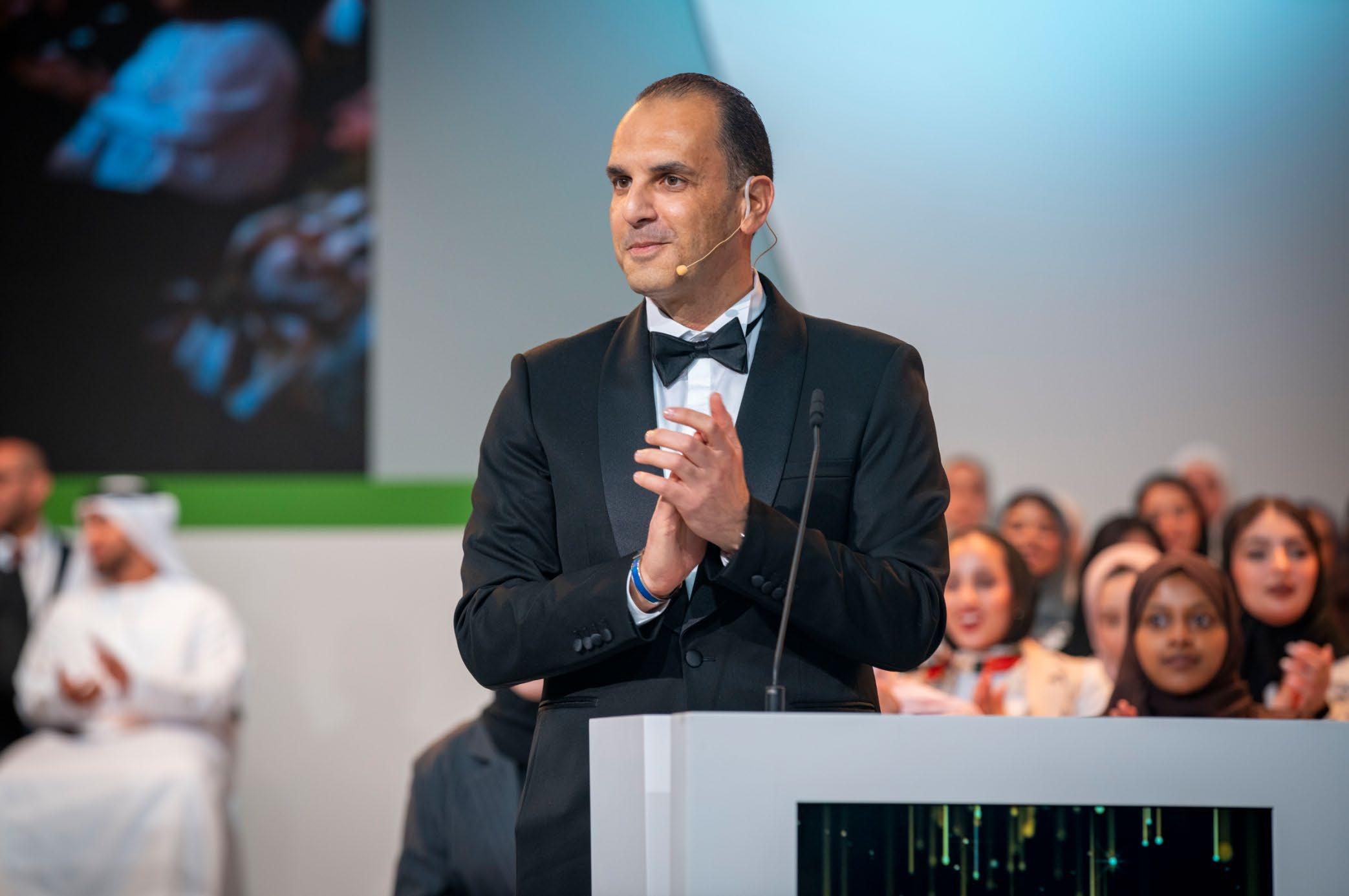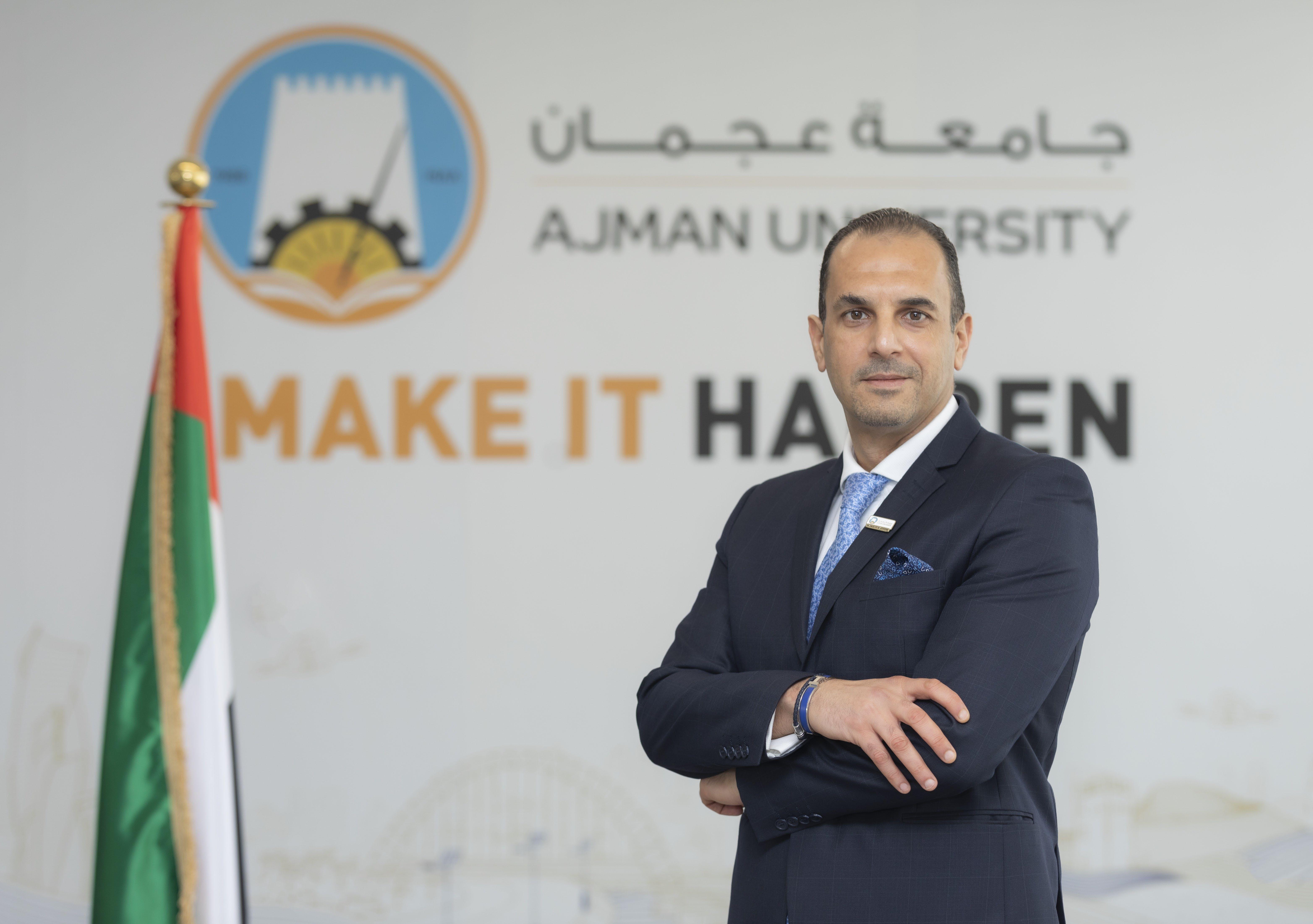
9 minute read
Leadership Spotlight Making Excellence in Business Education Happen at Ajman University
Interview with AU’s Chancellor, Dr. Karim Seghir
Dr. Seghir, we are so delighted that you’re joining us for this issue of UniNewsletter to discuss the customization of business education. Could you introduce yourself to our readers, including your background in business education and how you came to your current role as Chancellor of Ajman University (AU)?
Thank you for inviting me to participate in this issue of UniNewsletter. I was born in France and raised in Tunisia. I earned a BSc in Mathematics from the University of Tunis, followed by an MSc in Mathematical Methods in Economics and Finance, as well as a PhD in Mathematical Economics and Finance from Paris 1 Panthéon-Sorbonne University.
Before coming to AU, I served as Dean of the School of Business at the American University in Cairo
(AUC), where I also was Associate Dean for Undergraduate Studies and Administration, in charge of international accreditations such as the Association to Advance Collegiate Schools of Business (AACSB), the European Foundation for Management Development's (EFMD) Quality Improvement System (EQUIS) and Association of MBAs (AMBA). Prior to joining AUC, I was an Assistant Professor of Economics at the American University of Beirut.
I also worked as a visiting professor at Pontificia Universidade Catolica in Rio de Janeiro and at Universidad de Chile and I was a visiting researcher at Universidade NOVA in Lisbon.
I have been the Chancellor of AU since Jan. 1, 2017. Right when I heard about the university, the position and the location I was intensely excited. The United been named a high-confidence institution by the Commission for Academic Accreditation in the UAE

Arab Emirates (UAE) was gaining significant attention as a global East-meets-West hub for industry and entrepreneurship. Additionally, the country’s higher education landscape was growing exponentially with steady and strong leadership from the Ministry of Education.
The Emirate of Ajman, just a short drive from Dubai, is bustling and beautiful—with a lot of economic activity and lovely beaches. On my first visit, I was impressed by the stunning AU campus and the commitment of the entire community to excellence and societal impact.
I knew immediately that the possibilities were limitless, as they have indeed proven to be—thanks to the vision and leadership of the Board of Trustees, the entire team of dedicat- ed stakeholders and the unique blend of social compassion and technical innovation shown by our vibrant community. Every day at Ajman University, we are living proof of our “Make It Happen” motto!

We want to offer you our warmest congratulations on your recent appointment as Chair of the Association to Advance Collegiate Schools of Business (AACSB) Middle East and North Africa Advisory Council (MENAAC). Could you explain what this role will entail and its importance to the MENA region?
It is an honor to be appointed Chair of the AACSB MENA Advisory Council. This appointment underscores both my personal and professional commitment to excellence in business education. As Chair of MENAAC, my goal is to contribute to the advancement of business education in the region by taking an active role in shaping its future. I will focus on introducing region-specific services and programs, enhancing the employability of business graduates and fostering stronger connections between academia and industry. Through this proactive approach, I aim to ensure that business schools across the MENA region are not only well-represented but also fully engaged within AACSB’s global network, enhancing their impact on the international stage.
What specific challenges does the MENA region face in the successful teaching of business education, and relatedly, what region-specific opportunities are there for the growth of the discipline? And how does AU’s curriculum approach reflect these challenges/opportunities?
The MENA region is growing fast. More businesses. More universities. More students. More startups. A larger and more interconnected entrepreneurship ecosystem. The region is also characterized by a young population with more than 55 percent of the population below the age of 30, compared with 36 percent of the population across Organization for Economic Cooperation and Development (OECD) countries. However, the MENA region faces a significant challenge with youth unemployment, particularly among university graduates. In some countries, the unemployment rate for young graduates reaches approximately 40 percent. A primary contributing factor is the mismatch between the skills acquired through education and those demanded by the labor market. Addressing this issue requires aligning educational curricula with market needs, promoting vocational training and fostering private sector development to create employment opportunities. Solving this challenge is AU’s “center of gravity” and we’re building our curriculum around it. Some of what we’ve already implemented includes: completed 7 incubation cycles, mentored over 130 startups, and earned international and national accreditations, including from Global Innovation Institute (GINI), Institute of Innovation and Knowledge Exchange (IKE) and Dubai SME. I am proud to share that our incubated startups have tion, and what more can institutions do to ensure that their curricula reflect diverse global voices and perspectives? exchange of ideas in pursuit of a more inclusive and resilient society. In other words: excellence, compassion and innovation working together for the greater good. And that is exactly what we seek to do at AU—open a world of ideas and possibilities to everyone who comes through out of reach to many because of their socioeconomic status. Or their place of birth. Or their gender. Or a disability. Neglecting to ensure inclusivity in higher education risks perpetuating inequality and stifling both individual potential and societal progress.
• Launched the Masar Career Excellence Center to help students build relationship capital and achieve career goals, while also positioning them as future global leaders to our partners.
• Emphasize a hands-on, student-centered teaching approach, and a student-centric development journey.
• Foster interaction between private and public sectors in the classroom through guest speakers, company visits, and real-life problem-solving, encouraging students to think of regional solutions to global issues.
Our emphasis on student employability helped us earn the ranking of #1 in the UAE and #221 worldwide for Employer Reputation. We are deeply committed to making futures happen now!
Approximately 29 percent of MENA's total employment is in the public sector, nearly twice the global average (excluding China). However, an increasing number of students and alumni are seeking entrepreneurial paths. In response to this shift, AU launched the AU Innovation Center (AUIC) in 2016. The center's mission is to transform ideas and technologies into commercially viable ventures, driving economic development, job creation and youth empowerment.

To offer a truly global education and learning experience, we must have diverse global voices and perspectives on campus.

And we offer dozens of international exchange programs as well as social impact opportunities within the UAE and beyond. The experience at AU provides students with the chance to see the world on campus, which readies them to be part of the larger world after graduation.
At AU, our non-profit status means we stand for access. Our global ranking and accreditations mean we stand for excellence. There is no more powerful combination on Earth than access and excellence. It is life changing. Mind expanding. Heart opening. Game changing. Career making.
In what kind of roles, beyond the traditional, do you think that business education can prepare new students who are just entering the discipline to excel? And in what ways can universities prepare their students to pursue a variety of roles post-degree?
Business education is about creative thinking and innovative problem-solving. These are valuable skills for every graduate and meaningful to any career. Business schools should equip students for evolving roles in fields like Business Analytics and AI, Sustainability and Corporate Social Responsibility (CSR), Consulting and Advisory, Technology and Project Management—to name some. Business schools must adopt an interdisciplinary, interconnected, outward-focused, hands-on and tech-supported approach to learning and teaching. They should also collaborate with other schools such as engineering, IT, and Medicine as most global challenges are complex and require interdisciplinary approaches. In addition, business schools in the MENA region should provide relevant, high-impact executive education and middle management programs that align with the needs of economic development. These programs must be tailored to equip leaders and managers with the skills to navigate evolving market dynamics and drive innovation. By fostering strategic thinking and leadership excellence, such initiatives can play a crucial role in enhancing organizational performance and supporting


Thank you so much for your insights, Dr. Seghir. Lastly, we’d like to ask what kind of qualities and practices you think are important to ethical business leadership? And how do you try to model these qualities and practices within your own role as Chancellor of Ajman University?
Ethics and integrity are essential in every workplace and profession, and ethical leadership is grounded in specific traits. First, integrity—acting with honesty, authenticity, and transparency—builds trust both within the organization and with external stakeholders. As Chancellor, I prioritize transparency in decision-making, ensuring open communication with faculty, staff, students, alumni and partners. This fosters an environment where people feel heard and take ownership of their roles in advancing the University’s mission.
Empathy is another instrumental trait. Effective leaders connect with others' perspectives, regardless of their background. At AU, we take pride in our diverse community, and I engage actively with all members, understanding their challenges and aspirations. This inclusivity ensures better decision-making.


Accountability is equally important. Ethical leadership means taking responsibility for one’s actions. I lead by example, openly discussing our strategic goals and challenges, encouraging a shared sense of responsibility across the institution. This culture of ownership helps drive our mission forward.
Lastly, continuous learning and growth are key. Leaders must adapt and evolve. At AU, I promote a culture of learning for myself and the entire community to stay responsive to the evolving demands of higher education.
By embodying these values—integrity, empathy, accountability, and a commitment to growth—I aim to lead AU ethically, preparing our graduates to be ethical leaders themselves.





